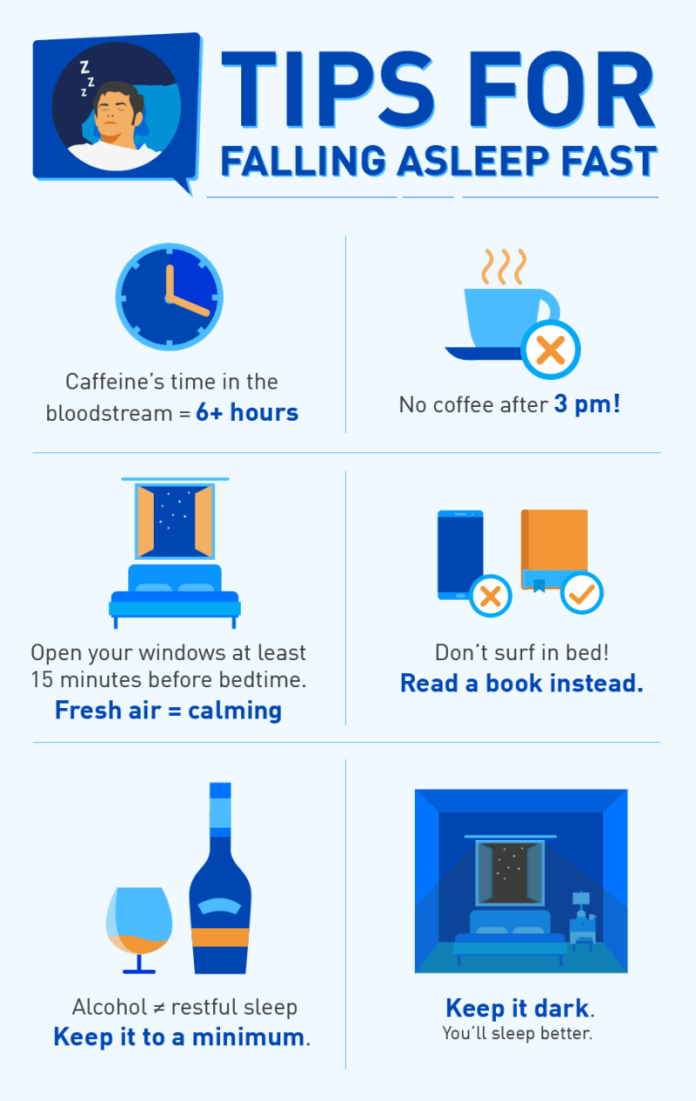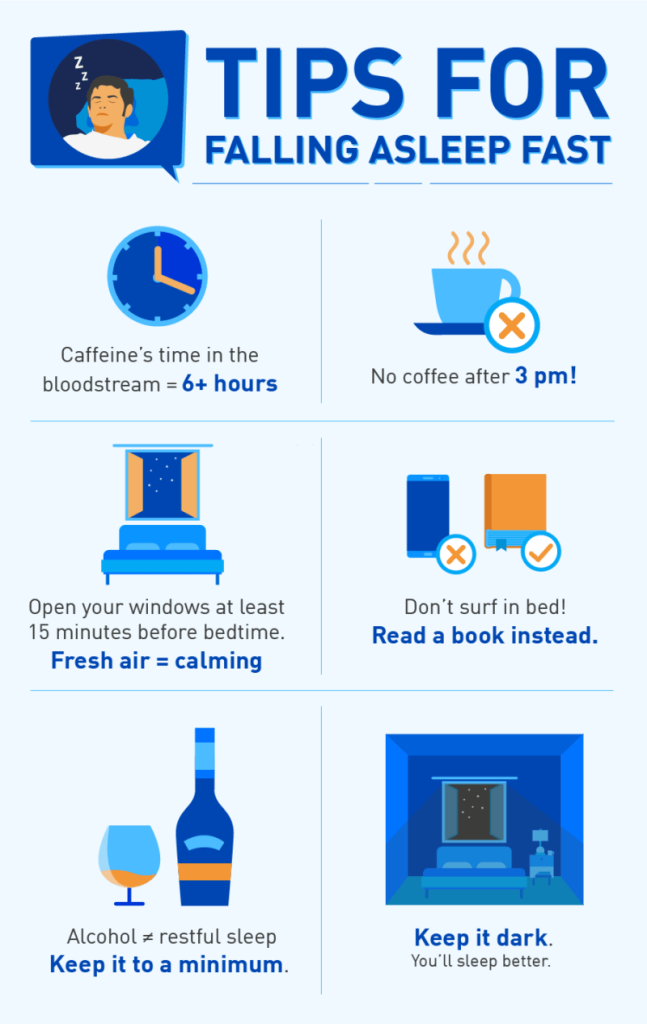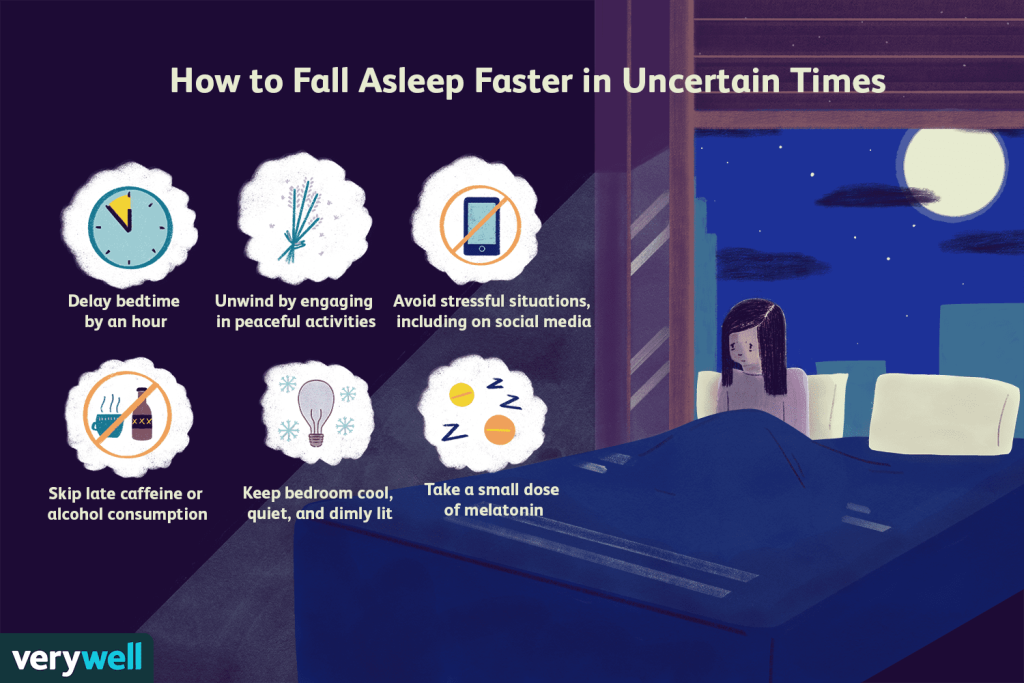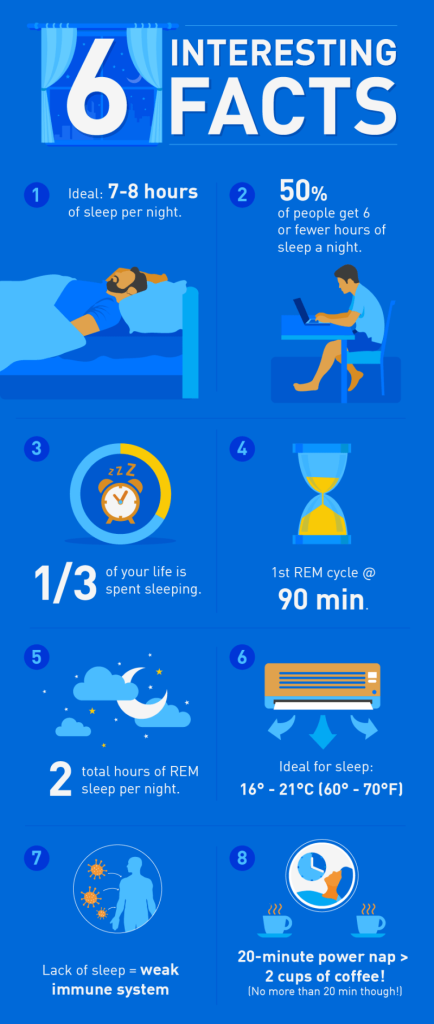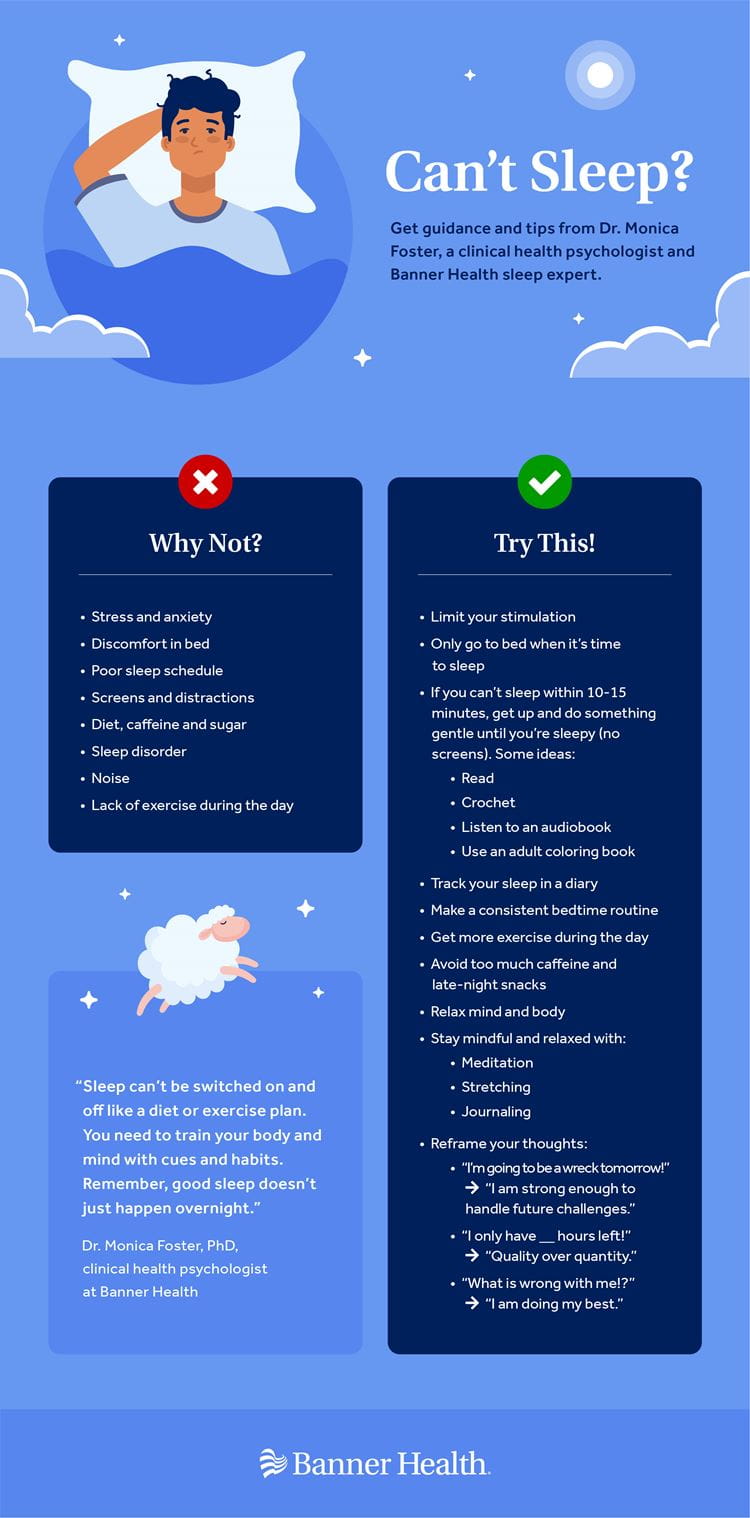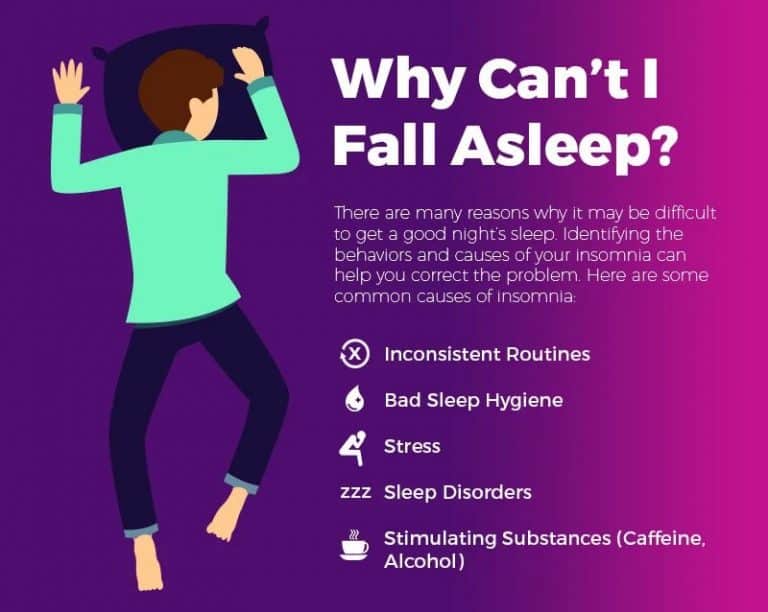Tired of tossing and turning in bed every night, desperately trying to fall asleep? We’ve got you covered! In this article, we’re sharing some tried and true tips to help you doze off faster and get the restful sleep you deserve. From creating a calming bedtime routine to optimizing your sleeping environment, we’ve compiled a collection of simple and effective strategies that will have you snoozing peacefully in no time. So, say goodbye to those sleepless nights and say hello to a well-rested and rejuvenated you!
This image is property of www.runtastic.com.
Review contents
Establish a bedtime routine
Having a consistent bedtime routine is essential for falling asleep faster and ensuring a good night’s rest. By following a routine, our bodies and minds become trained to recognize when it’s time to unwind and prepare for sleep. Here are a few steps to help establish an effective bedtime routine:
Create a consistent sleep schedule
One of the most important aspects of a bedtime routine is maintaining a consistent sleep schedule. Our bodies crave routine, and by going to bed and waking up at the same time every day, we can regulate our internal clocks and improve our overall sleep quality. Try to stick to your schedule even on weekends to enhance the effectiveness of this routine.
Wind down before bed
In our fast-paced modern lives, it’s crucial to give ourselves time to wind down before hitting the sack. Engage in activities that promote relaxation and help shift your mind into sleep mode. This could include reading a book, listening to soothing music, or practicing gentle stretching or deep-breathing exercises. Whatever helps you relax and unwind, make it a part of your bedtime routine.
Engage in relaxation techniques
Incorporating relaxation techniques into your bedtime routine can be incredibly beneficial for falling asleep faster. Techniques like meditation, progressive muscle relaxation, and guided imagery can help calm the mind, reduce anxiety, and prepare the body for sleep. There are many apps and online resources available that can guide you through these techniques, making them easily accessible for anyone.
Create a sleep-friendly environment
The environment in which we sleep plays a significant role in our ability to fall asleep faster. By optimizing our bedroom environment, we can create a space that is conducive to deep, restful sleep. Consider implementing the following tips:
Keep your bedroom cool and dark
A cool and dark bedroom is ideal for promoting sleep. Our bodies naturally cool down during the night, and a cooler room temperature can facilitate this process. Additionally, keeping the room dark helps to trigger the release of melatonin, the hormone responsible for regulating our sleep-wake cycle. Invest in blackout curtains or use an eye mask to block out any unwanted light that may disrupt your sleep.
Invest in a comfortable mattress and pillows
A high-quality mattress and pillows are essential for a good night’s sleep. If your mattress is old and uncomfortable, it can cause discomfort and pain, leading to difficulty falling asleep. Consider investing in a mattress and pillows that provide adequate support and help maintain a neutral spine alignment. This will ensure that you wake up feeling refreshed and ready to tackle the day.
Eliminate noise and distractions
Noise and distractions can significantly impact our ability to fall asleep faster. Consider using earplugs, a white noise machine, or a fan to drown out any unwanted sounds that may disturb your sleep. Additionally, remove any electronic devices, such as televisions or smartphones, from your bedroom. These devices emit blue light, which can interfere with the production of melatonin and disrupt your sleep.
Manage your exposure to light
Light exposure has a profound impact on our sleep-wake cycle. By managing our exposure to light, we can regulate our circadian rhythm and improve our ability to fall asleep faster. Here are a few tips to help manage light exposure:
Expose yourself to natural light during the day
Exposing ourselves to natural light during the day helps regulate our internal clocks and promotes a healthy sleep-wake cycle. Spend time outdoors, especially in the morning, to help reset your body’s internal clock. If you work in an office with limited natural light, consider taking short breaks outside or positioning yourself near windows to maximize your exposure to daylight.
Minimize exposure to artificial light at night
Artificial light, especially blue light emitted by electronic devices like smartphones and laptops, can disrupt our sleep. Blue light suppresses the production of melatonin, making it harder to fall asleep. Minimize your exposure to artificial light by avoiding electronic devices at least one hour before bedtime. Instead, engage in relaxing activities such as reading a book or practicing a hobby.
Consider using blue light filters
If reducing your exposure to artificial light is challenging, consider using blue light filters on your electronic devices. These filters reduce the amount of blue light emitted, making it easier on the eyes and less disruptive to your sleep. Many devices now have built-in blue light filter settings that you can activate in the evenings.
Avoid stimulants and sedatives
What we consume can have a profound impact on our sleep quality and how quickly we fall asleep. Avoiding certain substances can help promote a more restful night’s sleep. Consider the following tips:
Limit caffeine intake
Caffeine is a stimulant that can enhance alertness and make it difficult to fall asleep. It’s best to avoid consuming caffeine, found in coffee, tea, energy drinks, and even chocolate, in the evening hours. Limit your caffeine intake to the morning or early afternoon to give your body enough time to metabolize it before bedtime.
Avoid nicotine and alcohol before bed
Nicotine and alcohol can have detrimental effects on the quality of our sleep. Nicotine is a stimulant that can disrupt sleep, while alcohol may initially make us feel drowsy but can lead to fragmented and shallow sleep. Avoid both nicotine and alcohol in the hours leading up to bedtime to ensure a more peaceful and restorative sleep.
Be cautious with prescription medications
Certain prescription medications may interfere with sleep quality and make it harder to fall asleep faster. If you’re experiencing difficulties sleeping despite adopting a regular sleep routine, consult with your healthcare provider about the medications you’re taking. They may be able to adjust your dosage or suggest alternative medications that have fewer sleep-disrupting effects.
This image is property of www.verywellhealth.com.
Exercise regularly
Regular exercise is not only beneficial for our physical health but also for improving sleep. Engaging in physical activity during the day can help us fall asleep faster and experience deeper sleep at night. Consider the following exercise tips:
Engage in physical activity during the day
Participating in moderate-intensity aerobic exercise, such as brisk walking, swimming, or cycling, for at least 30 minutes during the day has been shown to improve sleep quality. Physical activity helps to reduce stress and anxiety, regulate our body temperature, and may enhance the production of sleep-promoting hormones.
Avoid intense exercise close to bedtime
While exercise can facilitate better sleep, intense workouts too close to bedtime can have the opposite effect. Vigorous exercise raises our core body temperature and stimulates the release of adrenaline and endorphins, making it harder to wind down and fall asleep. Try to finish your workouts at least two to three hours before bedtime to allow your body to cool down and relax.
Try relaxing exercises like yoga or stretching
If you’re looking for exercise options that promote relaxation and help you wind down before bed, consider incorporating activities like yoga, stretching, or gentle Pilates into your routine. These exercises can help reduce muscle tension, increase flexibility, and calm the mind, making it easier to transition into a restful state for sleep.
Establish a calming pre-sleep routine
A pre-sleep routine helps signal to our bodies that it’s time to relax and prepare for sleep. By engaging in calming activities before bed, we can promote a more tranquil state of mind and fall asleep faster. Consider the following suggestions:
Read a book
Reading a book before bed is an excellent way to unwind and escape into a different world before sleep. Choose a book that isn’t overly stimulating or suspenseful, as the goal is to relax, not get caught up in an exciting plot. Reading can help shift our focus away from everyday stressors and promote a sense of calm.
Listen to soothing music
Listening to soothing music can have a profound impact on our ability to fall asleep faster. Soft, gentle melodies or classical tunes can help to relax the mind and create a peaceful ambiance in your bedroom. Experiment with different genres to find what works best for you, and consider using a sleep playlist to help create a consistent routine.
Take a warm bath or shower
A warm bath or shower before bed can be incredibly relaxing and help us transition into a state of relaxation. The warm water can ease muscle tension and promote feelings of calmness, making it easier to fall asleep faster. Consider adding some calming aromatherapy oils, such as lavender or chamomile, to enhance the relaxation benefits.
This image is property of www.runtastic.com.
Limit napping during the day
Napping can be a double-edged sword when it comes to falling asleep faster. While a short nap can provide a quick energy boost and improve alertness, napping for too long or too close to bedtime can interfere with our ability to fall asleep at night. Follow these tips to optimize your napping habits:
Avoid long or late naps
Long or late naps can disrupt your natural sleep-wake cycle and make it harder to fall asleep at night. If you find it difficult to fall asleep fast, try to avoid napping for longer than 20-30 minutes. Additionally, avoid taking naps too close to your desired bedtime, as they can diminish your sleep drive.
Keep naps short and early in the afternoon
If you feel the need to take a nap, aim for short naps early in the afternoon. This timeframe works best as it allows you to refresh and recharge without interfering with your nighttime sleep. Set an alarm to ensure you don’t oversleep during your nap and keep it to a maximum of 20-30 minutes to avoid grogginess upon waking.
Manage stress and anxiety
Stress and anxiety are common culprits for keeping us awake at night. Engaging in stress-management techniques and addressing underlying anxieties are essential for falling asleep faster. Consider these strategies to help manage stress and anxiety:
Practice stress-management techniques
Incorporate stress-management techniques into your daily routine to help calm the mind and promote relaxation. Deep-breathing exercises, meditation, and mindfulness can all help reduce stress levels and create a sense of tranquility. Find what works best for you and make it a regular part of your pre-sleep routine.
Write in a journal
Writing in a journal can be a therapeutic way to process thoughts and emotions before bed. By writing down your worries or to-do lists, you can help clear your mind and alleviate some of your nighttime anxiety. Consider starting a gratitude journal as well, focusing on positive aspects of your day, to shift your mindset towards a more positive and relaxed state.
Seek professional help if needed
If your stress and anxiety levels are significantly impacting your ability to fall asleep faster, it may be beneficial to seek professional help. A therapist or counselor can provide guidance and support in managing stress and anxiety, helping you develop coping strategies that promote better sleep. Don’t hesitate to reach out if you feel overwhelmed and unable to manage these challenges on your own.
This image is property of www.bannerhealth.com.
Evaluate your diet
Our diet and eating habits can have a considerable impact on our sleep quality. Making mindful choices about what and when we eat can help us fall asleep faster and wake up feeling more refreshed. Consider these tips when evaluating your diet for better sleep:
Avoid heavy, spicy, or large meals before bed
Eating heavy, spicy, or large meals too close to bedtime can lead to discomfort, indigestion, and even acid reflux, making it difficult to fall asleep fast. Instead, opt for lighter meals that are easier to digest and won’t burden your stomach before sleep. If you experience hunger pangs before bed, consider a small, healthy snack like a piece of fruit or a handful of nuts.
Choose sleep-promoting foods
Certain foods can contain natural sleep-inducing compounds that can help you fall asleep faster. Consider incorporating foods rich in tryptophan, magnesium, and melatonin into your diet. Examples include bananas, cherries, almonds, turkey, and leafy green vegetables. Consult a healthcare professional or nutritionist for personalized dietary recommendations.
Stay hydrated throughout the day
Staying hydrated is important for overall health and can contribute to better sleep. Dehydration can lead to discomfort and nighttime awakening. However, be conscious of your fluid intake in the evening to avoid frequent trips to the bathroom during the night. Aim to consume most of your fluids earlier in the day and reduce intake closer to bedtime.
Consider sleep aids or relaxation techniques
If you’ve tried various strategies and still struggle to fall asleep faster, you may consider incorporating sleep aids or relaxation techniques into your routine. Here are a few options to explore:
Try over-the-counter sleep aids
Over-the-counter sleep aids, such as melatonin supplements or herbal remedies, can help regulate your sleep-wake cycle and support falling asleep faster. These aids are widely available but should be used with caution. Always follow the recommended dosage guidelines and check with your healthcare provider to ensure they won’t interact with any existing medications.
Explore natural remedies like herbal teas
Herbal teas, such as chamomile, lavender, or valerian root, have long been used to promote relaxation and aid in falling asleep faster. These teas can have a soothing effect on both the mind and body, helping you unwind before bed. Experiment with different blends and find the flavors and ingredients that work best for you.
Experiment with relaxation techniques
Relaxation techniques, such as aromatherapy, guided meditation, or breathing exercises, can be incorporated into your pre-sleep routine to promote a more tranquil state of mind. Experiment with different techniques and find what works best for you. Consider using essential oils, like lavender or chamomile, to enhance relaxation and create a peaceful atmosphere in your bedroom.
By incorporating these tips into our daily lives and establishing a comprehensive bedtime routine, we can greatly improve our ability to fall asleep faster and enjoy restful nights of sleep. Remember, finding the right routine may take some trial and error, but once you find what works for you, the benefits will be well worth the effort. Sleep tight!
This image is property of www.calmsage.com.

